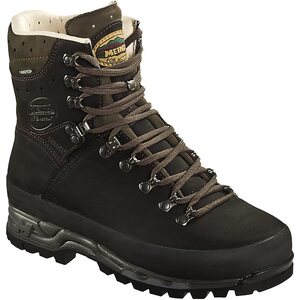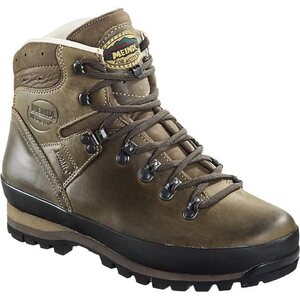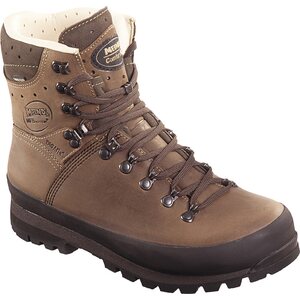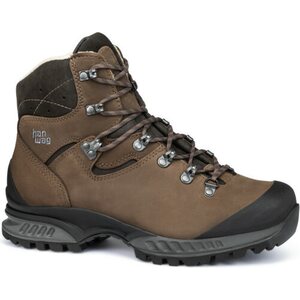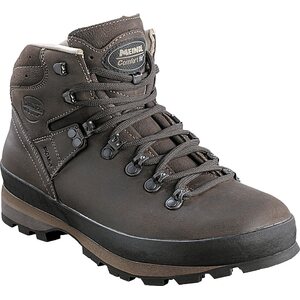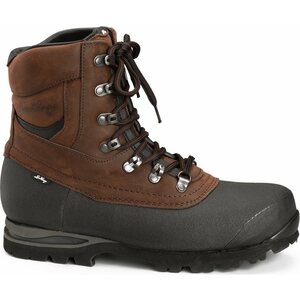Choose hiking boots based on the use and the fit. Are you going to do a week-long hike with a heavy backpack, or are you going to do little walks with your dog in nearby forests? Do you need to be able to attach crampons to the boots? In this guide, we show you what to consider when choosing hiking boots.
Stiffness
As a guideline, you can use, for example, the A-D classifications given by Meindl and Hanwag. The classifications indicates the stiffness of both the shaft and the sole. A is the least rigid shoe, best suited for roads and easy terrain, with D representing ice climbing shoes.
In Finnish conditions, B and B/C shoes are the most suitable for hiking, depending on the terrain, backpack and user. As a general rule, the more weight you put on the shoe, the stiffer the sole should be. In more challenging terrain, proper ankle support is also important. Lightweight, flexible shoes are best suited for hikers with light loads and for easier terrain.
However, the user's familiarity and experience will also play a role: more experienced hikers can go with lighter shoes, while first-timers should prefer slightly stiffer and sturdier shoes. Even with rigid soles, there are differences in rolling characteristics, so it's important to get a shoe fitted before you buy.
Material
In terms of materials, hiking boots are made of textile or leather, often nubuck leather. Leather shoes require care, but well cared for they mould to the foot and stand up well to wear and tear. Increasingly, shoes are also combining leather with technical materials. Different material and technical solutions are used to improve the lightness or breathability of the shoe, for example.
With or without membrane?
When buying hiking shoes, you should also consider whether you want a shoe with or without a membrane. The Gore-Tex membrane usually used in membrane hiking boots retains water better, while unmembrane boots generally breathe better and dry faster. Lundhags also manufactures rubber edge boots without membrane.
Also available are double-stitched hiking boots. The traditional double stitching is both attractive and durable. Shoes with genuine double stitching come, by default, without membrane.
体育运动»户外运动»鞋子»登山靴»
带透气网
体育运动»户外运动»鞋子»登山靴»
不带有透气网
Size and fitting
Choosing the right size is essential. Hiking shoes should fit snugly so that your foot cannot move around inside the shoe and form blisters on your foot. However, there should be enough room to accommodate one thicker hiking sock or a liner sock and an oversock. A leather shoe will stretch somewhat in use, but there should be enough room in length to prevent the toes from hitting the toe of the shoe when going downhill. Often feet also tend to swell towards the end of the evening, especially at the end of a longer walk.
When fitting a hiking boot, keep these things in mind:
- Try on allways both shoes. There are normally differences between right and left feet.
- Try on shoes in the morning and in the evening. The foot size changes during the day.
- Walk in the boots for a moment, at least 10 minutes, to give your feet and boots some time to settle.
- It's always a good idea to try on shoes with the socks you'll be wearing in the future.
- Once the shoe is on and the heel is in the cup, the lacing of the shoes begins. The toung must be straight and centered.
- The toes must not slide downhill to the tip of the shoe, so when standing, there should be at least a centimetre of space in front of them.
- Hiking boots must feel sturdy on your feet.
- Of the two options, you should always choose the bigger one.
Last and model
Different manufacturers offer different types of shoe lasts and sizing charts, but you should always fit your hiking shoe. For example, Meindl's Wide and Comfort Fit, Lundhags' Opti and Hanwag's Wide are suitable for wider feet. In principle, children's shoes are not suitable for adults, as the sole is lighter and not designed to carry the weight of an adult.
Mid-cut hiking boots are the most popular choice for hiking. The shaft provides protection and support for the foot in difficult terrain.
Wide width models in our range:
体育运动»户外运动»鞋子»登山靴»带透气网»男士用品»
Meindl
Guffert GTX
279,90 - 294,90 €
(223,03 - 234,98 €, 增值税 0)
有现货
☆☆☆☆☆ (143)
体育运动»户外运动»鞋子»登山靴»不带有透气网»
Hanwag
Tatra II Wide
269,00 €
(214,34 €, 增值税 0)
有现货
☆☆☆☆☆ (39)
体育运动»户外运动»鞋子»登山靴»带透气网»女士用品»
Meindl
Bernina Lady 2 GTX
活动价 285,35 €
(227,37 €, 增值税 0)
有现货
☆☆☆☆☆ (44)
体育运动»户外运动»鞋子»登山靴»不带有透气网»
Lundhags
Jaure II Mens Mid 登山靴
活动价 360,19 €
(287,00 €, 增值税 0)
有现货
☆☆☆☆☆ (34)
Responsibility
A well-cared boot is durable. It's possible to change an old base of most of the traditional leather hiking boots for a new one, which extends the shoe life. Leather matters, too, since manufacturing of shoes, as well as other products, puts pressure on the environment. Many manufacturers use more environment-friendly Heinen Terracare leather.
After purchase
Once you have found and purchased the hiking boots you need, the first step is the "break-in", which should take a few weeks. Before setting off on your actual hike, you should walk in the shoe for several short stretches to ensure that the shoe shapes and fits your foot well. Fortunately, the break-in period is not as difficult or time-consuming as it was a few years ago. Here's what you need to know:
- Use the right kind of socks.
- Make sure the tongue is centered and stays centered.
- Lace the boots carefully.
- You can start the break-in process at home by just wearing the boots.
- After that, take short walks outside for a few weeks, but no more than a few hours at a time.
- If you notice any pressure points or pain, give your feet a rest. You can help the boots mold to your feet by walking in wet grass. Once wet, the boots will find their place more easily.
Hiking boot care
Regular maintenance is crucial for the durability of the boots. Various boot manufacturers provide guidelines for boot care. It is advisable to start caring for the boots immediately, even before their first outdoor use. Proper care and maintenance will extend the life of the boots and are usually essential for maintaining the warranty.
Hiking boots require both waxing and waterproofing impregnation before use. The boots should be kept clean and regularly impregnated and waxed even during use.
Meindl footwear, for example, comes with a pre-shaped, moisture-wicking insole. Using the right insole, along with quality socks, is part of a functional boot system. A worn, dirty, and compressed insole should be replaced with a new one.
Read more about leather boot care in our maintenance guide
You might also be interested in
Why choose a merino wool base layer?
In collaboration with Devold
Merino wool has long been the trusted base layer material for hikers, outdoor enthusiasts, and active people. It is nature’s own super material, performing well both in everyday life and in demanding conditions. A merino wool base layer is often the f...
Tehokasta ja pitkäkestoista suojaa hyttysiä ja muita ötököitä vastaan
Yhteistyössä Care Plus ja Craghoppers
Matkailukauden lähestyessä on hyvä hetki pysähtyä miettimään, miten suojautua tehokkaasti hyttysiä, punkkeja ja muita verta imeviä hyönteisiä vastaan. Olitpa sitten suuntaamassa eksoottiselle kaukomatkalle tai valmistautumassa kotimaan mökkir...
Vastuullista laatua ja pohjoista kestävyyttä jaloillesi
Yhteistyössä Kamik
Kun talvi kiristää otettaan ja loska, lumi sekä pakkanen haastavat arjen, moni miettii, mitkä kengät pitävät jalat oikeasti lämpiminä ja kuivina. Usein mieleen tulee tunnettuja pohjoismaisia tai kanadalaisia brändejä – mutta oletko jo tutustunut Kamikiin? Kamik...
